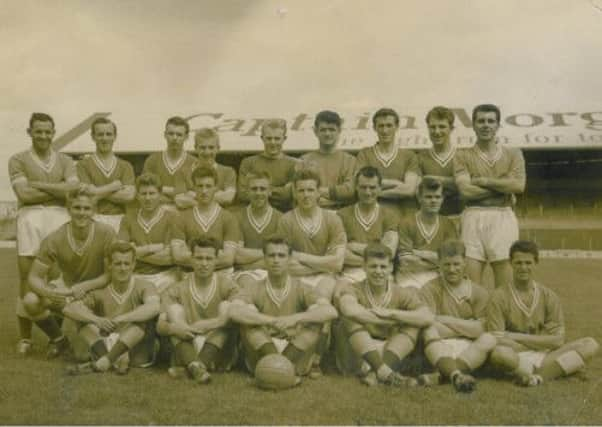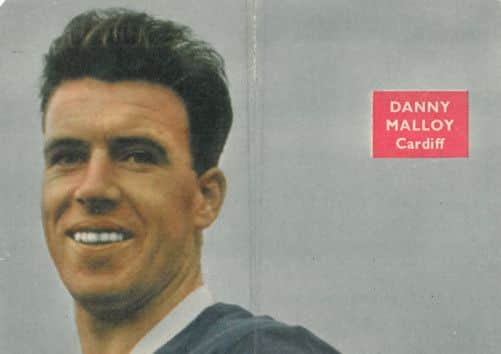Danny Malloy: The Scot who left his mark on Cardiff


On Tuesday night, Malky Mackay’s side – which, as well as the Bellshill-born manager, featured four Scots in the playing squad – finally made the step up to the English Premier League.
The last time Cardiff achieved this feat they were inspired by a Scottish skipper by the name of Danny Malloy, whose fierce commitment to the cause is still fondly remembered in the city, more than half a century on. His story should be more widely known – and now, with perfect timing, it is being spread beyond the valleys of Wales, as well as the banks of the Tay, where the Stirlingshire-born Malloy first came to prominence as a hard-tackling and popular centre-half for Dundee.
Advertisement
Hide AdAdvertisement
Hide AdOn publication of a book, the hope is that its appearance might coincide with a relevant event in order to help lend the marketing of the work some impetus. When Andy Malloy began to chronicle his father’s memoirs, he could only have dreamt that the book’s publication date might fall in the month when Cardiff City made it back to the top flight of English football, winning promotion for the first time since his father led them to these heady heights.


Captaining the Bluebirds to promotion in season 1959-60 stands as Malloy’s finest achievement as a player, while leaving the club after they had managed to stay up remains his greatest regret. The maximum wage limit had just been lifted and, reasoning that he was captain of a side who had done well to retain their top tier status, Malloy requested a weekly wage rise of £10, taking him to £30 from £20.
This wasn’t entertained by manager Bill Jones and when Malloy had his head turned by Fourth Division side Doncaster Rovers, who agreed to this wage demand and more, Malloy, still only 31, left to become player-manager at the Yorkshire club. “Big, big mistake,” his son Andy says now. “In a matter of weeks, I had gone from the prospect of another season in the top flight of English football, lining up against the likes of Spurs, Manchester United and Chelsea, to visiting places such as Workington, Rochdale and Mansfield,” reflects Malloy senior in his memoirs.
Quickly returning home to Scotland, where he joined Clyde, Malloy has only returned to Cardiff twice since. The first time, in 1977, was for the funeral of his brother Ian, who moved to Wales as well when Malloy signed, and built his own life there, until he died after a severe asthma attack aged only 40. The other occasion was in 2009, when he was invited back down for Cardiff’s last game at Ninian Park, against Ipswich Town.
“He was treated like a hero,” remembers Andy. “I could not believe how well he was thought of. Everyone was coming up and shaking his hand. He was a wee bit overwhelmed to be honest. When they did the walk on at half-time, he was introduced on to the park and the reception was deafening.”
While the book’s publication has been expertly timed, Malloy’s recently failing health has not. Now aged 82, he could not join his son on the trip to Cardiff last weekend, when the book was launched on the morning of the league match with Nottingham Forest.
The 3-0 win left Cardiff needing only a point to gain promotion, and which they duly earned on Tuesday, courtesy of the goalless draw with Charlton Athletic. The aim is to avoid what happened in 1960, when Cardiff took only two points from their final three games after securing promotion, ending up as runners-up to champions Aston Villa.
Whatever happens, the main objective has been achieved. Currently in hospital in Larbert, Malloy received news of the promotion from his son in a phone call. “He was quite emotional,” says Andy. It is particularly saddening that Malloy has succumbed to illness at such a significant time, and having avoided serious ill health – and doctors – all of his life. Like many hard men, he trembled at the thought of hospital.
Advertisement
Hide AdAdvertisement
Hide Ad“He is a poor soul,” admits Andy. “He is not eating. He has always hated going to doctors or hospitals – he just wouldn’t go. He had never been in hospital. He was always a big guy but he has been losing weight over the weeks. He was still managing to get around until recently, driving his car and walking his dog.
“When I came back up after the game [v Forest], I didn’t get in until the early hours, and it was half past 11 in the morning when I went to see him, and he was still in his bed. I thought, ‘That’s not him’.”
It certainly doesn’t fit with the image of Malloy as the enforcer of old. There is one story that has gone down in Cardiff legend, although Malloy only told Andy about the time he silenced Brian Clough more recently. It is referred to as simply the ‘Brian Clough Incident’ in the book. “I didn’t even know anything about that until about ten years ago,” says Andy. “It slipped out. I checked it on Wikipedia. ‘You are something else,’ I told him. ‘You never even mentioned it!’ He said: ‘I am not proud of it. I am actually quite ashamed’.”
After being on the receiving end of some typical Clough verbals, Malloy knocked out the then Middlesbrough striker with a right hook. “There was no trial by television then,” says Andy. “He would probably be banned every game now, some of the things he got up to.”
Although even the title of his own book bills him as a hard man, Malloy was only sent off once in his career – in a reserve game playing for Dundee at Brechin. He amassed more own goals than orderings-off, and his total of 14 for Cardiff remains a club record, and told the story of someone who thought nothing of flinging his body in the way of shots, which would sometimes deflect off him into the net. Despite the own goals, he remains revered in Cardiff, and, though visits back to the Welsh capital have been rare, Malloy can rest assured that he remains part of the club’s heritage, even given the change of ground, and new horizons promised by significant new investment from ambitious Malaysian owners.
“My cousin Andrew was walking up to the FA Cup final between Cardiff and Portsmouth in 2008 and there was someone ahead of him with a modern shirt and a No 5, with Malloy above it,” recalls Andy. “He could not believe it. This guy had obviously not seen dad play and yet he had heard stories passed down a generation.”
• Memoirs of a Hard Man – the Danny Malloy Story [Vertical Editions, £11.99]